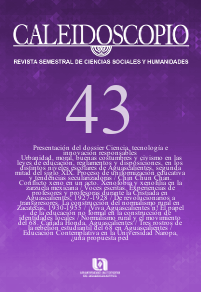Presentación del dossier Ciencia, tecnología e innovación responsables
DOI:
https://doi.org/10.33064/43crscsh2288Downloads
Métricas
Referências
Arnaldi, S., Quaglio, G., Ladikas, M., O’Kane, H., Karapiperis, T., Srinivas, K. R. y Zhao, Y. (2015). Responsible governance in science and technology policy: Reflections from Europe, China and India. Technology in Society, 42, 81–92. doi:10.1016/j.techsoc.2015.03.006
Bauer, M. (Ed.) (1995). Resistance to new technology. Nuclear power, information technology and biotechnology. Cambridge: Cambridge University Press.
Eizagirre, A., Rodríguez, H. e Ibarra, A. (2017). Politicizing responsible innovation: Responsibility as inclusive governance. International Journal of Innovation Studies, 1(1), 20–36. doi:10.3724/SP.J.1440.101003
European Commission (2007). Integrating Science in Society Issues in Scientific Research. Main findings on the integration of Science and Society issues in the Sixth Framework Programme. Bruselas: European Commission.
European Commission (2011). Communication from the Commission to the European Parliament, the Council, the European Economic and Social Committee and the Committee of the Regions. Horizon 2020 - The Framework Programme for Research and Innovation, COM(2011) 808 final of 30 November 2011. Bruselas.
European Commission (2013). Horizon 2020, Work Programme 2014–2015: 16. Science with and for Society, C(2013) 8631 of 10 December 2013. Bruselas.
Felt, U. (rapporteur), Wynne, B. (chairman), Callon, M., Gonçalves, M. E., Jasanoff, S., Jepsen, M., Joly, P. B., Konopasek, Z., May, S., Neubauer, C., Rip, A., Siune, K., Stirling, A. y Tallacchini, M. (2007). Taking European Knowledge Society Seriously. Report of the Expert Group on Science and Governance to the Science, Economy and Society Directorate, Directorate-General for Research, European Commission (EUR 22700). Bruselas: European Commission.
Godin, B. (2015). Innovation Contested: The Idea of Innovation Over the Centuries. Londres: Routledge.
Luján, J. L. y López Cerezo. J. A. (2004). De la promoción a la regulación. El conocimiento científico en las políticas públicas de Ciencia y Tecnología. En J. L. Luján y J. Echeverría (Eds.), Gobernar los riesgos. Ciencia y valores en la sociedad del riesgo (pp. 75–98). Madrid: Biblioteca Nueva/OEI.
Lund Declaration (2009). Europe Must Focus on the Grand Challenges of our Time. En U. Svedin (rapporteur), New Worlds – New Solutions. Research and Innovation as a Basis for Developing Europe in a Global Context (The Swedish EU Presidency Conference – Final report) (pp. 40–41). Lund (Suecia), 7-8 de julio de 2009.
Macnaghten, P. y Guivant, J. (2011). Converging citizens? Nanotechnology and the political imaginary of public engagement in Brazil and the United Kingdom. Public Understanding of Science, 20(2), 207–220. doi:10.1177/0963662510379084
Marklund, G., Vonortas, N. S. y Wessner, C. W. (Eds.) (2009). The Innovation Imperative: National Innovation Strategies in the Global Economy. Cheltenham y Northampton, MA: Edward Elgar.
Nelkin, D. (Ed.) (1984). Controversy: Politics of Technical Decisions. Thousand Oaks, CA: Sage.
OECD [Organisation for Economic Co-operation and Development] (2015). The Innovation Imperative: Contribution to Productivity, Growth and Well-Being. París: OECD.
Owen, R. y Pansera, M. (2019). Responsible Innovation and Responsible Research and Innovation. En D. Simon, S. Kuhlmann, J. Stamm y W. Canzler (Eds.), Handbook on Science and Public Policy (pp. 26–48). Cheltenham y Northampton, MA: Edward Elgar.
Owen, R., Bessant, J. y Heintz, M. (Eds.) (2013). Responsible Innovation: Managing the Responsible Emergence of Science and Innovation in Society. Chichester: Wiley.
Owen, R., Macnaghten, P. y Stilgoe, J. (2012). Responsible research and innovation: From science in society to science for society, with society. Science and Public Policy, 39(6), 751–760. doi:10.1093/scipol/scs093
Rodríguez, H., Eizagirre, A. e Ibarra, A. (2019). Dynamics of responsible innovation constitution in European Union research policy: tensions, possibilities and constraints. En R. von Schomberg y J. Hankins (Eds.), International Handbook on Responsible Innovation: A Global Resource (pp. 167–180). Cheltenham y Northampton, MA: Edward Elgar.
Sarewitz, D. (1996). Frontiers of Illusion: Science, Technology, and the Politics of Progress. Filadelfia, PA: Temple University Press.
Vasen, F. (2017). Responsible Innovation in Developing Countries: An Enlarged Agenda. En L. Asveld, R. van Dam-Mieras, T. Swierstra, S. Lavrijssen, K. Linse y J. van den Hoven (Eds.), Responsible Innovation 3: A European Agenda? (pp. 93–109). Cham: Springer.
von Schomberg, R. y Hankins, J. (Eds.) (2019). International Handbook on Responsible Innovation: A Global Resource. Cheltenham y Northampton, MA: Edward Elgar.
Zwart, H. y Nelis, A. (2009). What is ELSA genomics? Science & Society Series on Convergence Research. EMBO Reports, 10(6), 540–544. doi:10.1038/embor.2009.115
Zwart, H., Landeweerd, L. y van Rooij, A. (2014). Adapt or perish? Assessing the recent shift in the European research funding arena from ‘ELSA’ to ‘RRI’. Life Sciences, Society and Policy, 10(1), 11. doi:10.1186/s40504-014-0011-x
Publicado
Como Citar
Edição
Seção
Licença
Licencia Creative Commons Atribución-NoComercial-CompartirIgual 4.0 Internacional
El lector es libre de compartir o adaptar el material en cualquier medio o formato bajo las condiciones siguientes: (a) debe reconocer adecuadamente la autoría, proporcionar un enlace a la licencia e indicar si se han realizado cambios; (b) no puede utilizar el material para una finalidad comercial y (c) si remezcla, transforma o crea a partir del material, deberá difundir sus contribuciones bajo la misma licencia que el original.
Resumen de la licencia
https://creativecommons.org/licenses/by-nc-sa/4.0/deed.es_ES
Texto completo de la licencia
https://creativecommons.org/licenses/by-nc-sa/4.0/legalcode
Cada autor es responsable del contenido de su artículo. En el caso de un texto colectivo, el primer autor asume la responsabilidad intelectual de los resultados del proceso editorial; los autores son responsables de obtener la licencia de autor para reproducir materiales gráficos o fotográficos que pertenecen a terceros.
Los autores asumen plena responsabilidad en el caso de falsificación de datos o falta de autenticidad en la investigación. Se comprometen, también, a no reutilizar trabajos ya publicados, total o parcialmente, para presentarlos en otra publicación.
Estas condiciones aplican tanto a la versión impresa como a la versión electrónica de la revista.

























